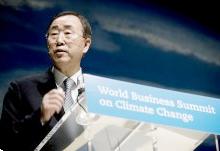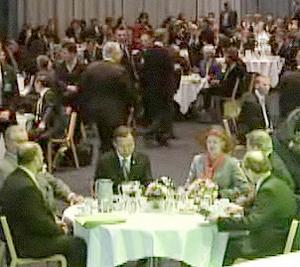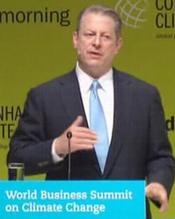World Business Leaders Hear Catastrophic Climate Warnings
COPENHAGEN, Denmark, May 25, 2009 (ENS) - "We meet at a critical moment in human history. Our planet is warming to dangerous levels," UN Secretary-General Ban Ki-moon told the opening session of the World Business Summit on Climate Change in Copenhagen on Sunday.
Encouraging world business leaders to create a global economy that is "cleaner, greener and more sustainable, Ban told 700 delegates from the business community that "climate change is the defining challenge of our time."
 |
UN Secretary-General Ban Ki-moon (Photo courtesy Copenhagen Climate Council/Peter Sørensen) |
"You and your colleagues have the ingenuity and vision to lead by example where others, including governments, are lagging behind," he said. "With your support and through your example, we must harness the necessary political will to seal the deal."
In Copenhagen in December, governments are expected to conclude negotiations on a successor pact to the Kyoto Protocol, whose first commitment period for reducing greenhouse gas emissions ends in 2012.
"This will not be easy," warned Ban. "Fundamental change never is. But if we get it right, we can reasonably look forward to sustained growth and prosperity. If we get it wrong, we face catastrophic damage to people, to the planet and to the global marketplace."
"Our excessive reliance on a fossil-fuel based economy is destroying our planet's resources, and impoverishing the poor, weakening the security of nations and it is choking global economic potential," the secretary-general said.
The World Business Summit on Climate Change was organized by six of the most influential business initiatives on climate change: 3C - Combat Climate Change, the Climate Group, the UN Global Compact, the World Business Council for Sustainable Development, the World Economic Forum and the Copenhagen Climate Council.
The Copenhagen Climate Council is a global collaboration between business and science founded by an independent think tank in Scandinavia called Monday Morning, based in Copenhagen.
 |
Dignitaries and keynote speakers at the head table on opening day (Photo courtesy Copenhagen Climate Council) |
The opening day was attended by Queen Margrethe II of Denmark and Prince Consort Tim Flannery, scientist and author who chairs the Copenhagen Climate Council.
The United Nations will be issuing a "Copenhagen Call" on Tuesday at the end of the three-day meeting, Ban said, appealing to the private sector to use its influence to raise awareness of climate change.
"As business leaders, you must make it clear that doing the right thing for the climate is also the smart thing for global competitiveness and long-term prosperity," he said. "We may never get a better opportunity. And if the world's scientists are right, we may not get a second chance."
Ban urged participants to mobilize their employees, partners and others to demand urgent action on the issue, as well as to continue finding private-sector methods to slash climate risks.
"Your customers and your shareholders will reward you," said the secretary-general, who will be convening a high-level summit on climate change in September. "And your children will thank you one day."
According to some estimates, Ban said, rising greenhouse gas emissions could lead to a five percent drop in global Gross Domestic Product. On the other hand, he cited projections from the Intergovernmental Panel on Climate Change that it could cost as little as 0.1 percent of global GDP annually until 2030 to reduce greenhouse gas emissions to safer levels.
A new climate pact in December will be a boon to businesses, Ban predicted. "We know that the right kind of deal will provide the regulatory certainty and long-term price signals that businesses are demanding. We know that a deal can unleash investment, stimulate innovation and facilitate the global spread of low-carbon technologies."
Action on climate change should not be put on hold during a global recession, he said, emphasizing that while a global bail-out may seem costly now, "it will pale next to the enormous human and economic costs of delaying action on climate change."
 |
Former U.S. Vice President Al Gore (Photo courtesy Copenhagen Climate Council/Peter Sørensen) |
Former U.S. Vice President and Nobel Peace Laureate Al Gore told the business leaders that the test of what is right where the climate is concerned lies with the next generation.
"We hear the voices of the next generation now. They are ready for us to meet this challenge. They will live in the world shaped by the decisions are made in Copenhagen less than seven months from now. And those decisions in turn will be shaped by the advice and deliberations of the world's business community gathered here in Copenhagen this week," said Gore.
"We have everything we need to do it with the possible exception of political will," he said, "but we know that political will is a renewable resource."
"But there's not much time. We have to do it this year, not next year, this year," Gore warned. "The risk of failure would be a risk that the political cohesion that has brought us this far would begin to fray."
"And of course," he said, "the clock is ticking because Mother Nature does not do bailouts."
Gore raised the expectation that President Barack Obama would work with other world leaders to conclude a successful agreement limiting greenhouse gas emissions in Copenhagen in December.
He cited Obama's move, within one month of becoming President to pass "a green stimulus bill that constituted the largest renewable energy bill in the history of my nation," and the announcement last week of "a dramatic change in truck and auto mileage standards."
Gore recounted for the business leaders last week's passage out of the U.S. House of Representatives Energy and Commerce Committee of the American Clean Energy and Security Act of 2009 that could lead to reduction in global warming pollution below the 1990 baseline. "The bill in my view needs improvement and strengthening," said Gore, "but it is moving forward and my prediction is that it will pass and will become law."
Gore reminded the business leaders that record droughts, fires, storms, flooding and tropical disease migrations are already occurring and are a taste is what is to come if greenhouse gases are not quickly brought under control.
"Every nation and business has a leadership role to play," Gore said. "The time to act is now. The urgency that I sense in this room is felt all around the world. This is, properly understood, not a political issue but a moral issue."
Today, European Commission President Jose Barroso told the business leaders of the greenhouse gas reduction targets that the European Union has pledged to meet and what Europe expects of other industrialized and developing countries.
"When the Commission's energy and climate change package was recently formally adopted, Europe became the first region in the world to implement such far-reaching, legally binding climate and energy targets," said Barroso.
"The package delivers on EU leaders' commitments in March 2007 to reduce greenhouse gas emissions by at least 20 percent of 1990 levels and to raise the share of energy consumption provided by renewable resources to 20 percent, both by 2020," he said. "It also contributes to the target of improving energy efficiency by 20 percent."
"Critically, the package also lays the basis for increasing the emissions reduction from 20 percent to 30 percent in the context of a satisfactory international climate agreement in which other developed and developing countries contribute their fair share to the limiting global emissions," Barroso said.
The EU has asked developed countries to commit collectively to cut emissions by 30 percent below 1990 levels by 2020. He said the EU has proposed "a balanced combination of criteria to compare developed country targets, and to help ensure equivalence of effort."
"Secondly, and as agreed in Bali, we want to see developing countries do their part by designing and implementing national low carbon development strategies containing a set of mitigation actions for each key emitting sector, so that collectively they reduce their emissions by 15 to 30 percent below Business as Usual by 2020."
These targets are far above the average five percent target set by the Kyoto Protocol for its 37 industrialized countries and the European community to reduce the emissions of a basket of six greenhouse gases. The five percent reduction is against 1990 levels over the five-year period 2008-2012.
The results of the World Business Summit on Climate Change will be presented to the Danish government, host of the UN conference on climate change, and to world leaders negotiating the terms of the next international climate treaty.
Danish Minister of Climate and Energy Connie Hedegaard said, "We, the politicians of the world, have a responsibility to reach a truly global climate change agreement in Copenhagen in December 2009. But it is the business society that can deliver the tools to turn our vision into reality. Businesses can provide the clever solutions to make it possible to live in a both modern and sustainable society."
Copyright Environment News Service (ENS) 2009. All rights reserved.
To subscribe or visit go to: http://www.ens-newswire.com